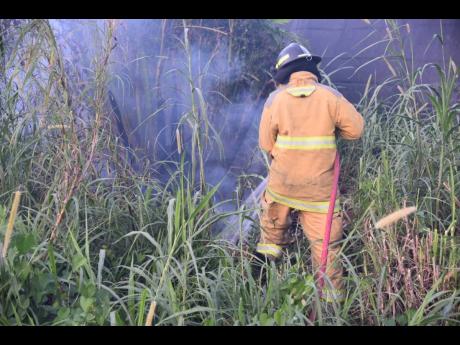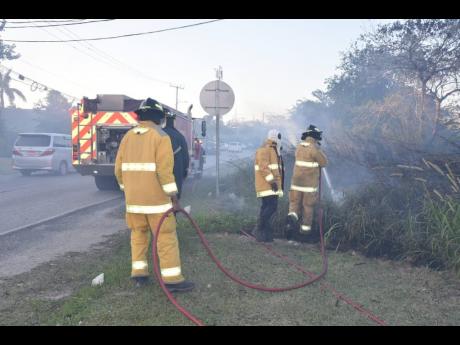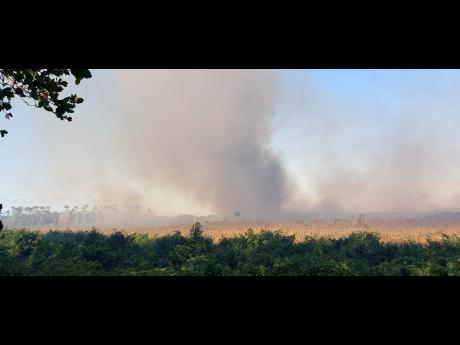Business leaders urge climate change mitigation as Negril morass burns again
Visitors, locals in turmoil as resort town faces second disaster in weeks
WESTERN BUREAU:
Thursday’s fire at the Negril Great Morass has reignited major concerns surrounding climate change and its negative implications by stakeholders in the resort town.
The fire has reportedly been on and off since last week; however, it began spreading towards business places along Norman Washington Boulevard in Negril, which is shared between western Hanover and western Westmoreland, on Thursday morning.
Managing director of the Boardwalk Village, Richard Wallace, told The Gleaner that while Negril is no stranger to morass fires, Thursday’s blaze was the worst he has seen.
“We can almost always expect to have a morass fire every year. This one, in particular, seems more intense,” he said.
Negril has been experiencing the effects of adverse weather conditions since the start of February. With hoteliers still recovering from a worrying increase in seaweeds and damage caused by a recent front, Wallace stated that more emphasis should be placed on mitigating the effects of climate change.
“It’s unfortunate. These series of events that have been happening – the rough seas, the seaweed and now the morass fire – what this tells us is that climate [change] is something we have to prepare for and deal with going forward,” said Wallace, the immediate past president of the Negril Chamber of Commerce.
“Climate change is real and these are the effects of climate change that we are feeling. Whenever we have dry and windy conditions, like we do now, that is what happens; we normally have a morass fire,” the hotelier lamented.
While pointing to soot and ash covering the outdoor furniture at his hotel, Wallace told The Gleaner that his guests were forced to either spend their day inside their rooms or visit neighbouring parishes to enjoy a day out.
At the same time, his staff members were issued masks as a mean of mitigating the effects of the thick smoke blanketing the property.
“It was very smokey with dust and ash blowing around. People with allergies are having a serious issue and ... people with other respiratory issues are having a hard time now,” explained Wallace.
Approximately US$15,000 was reportedly earmarked for the introduction of an Integrating Water, Land and Ecosystems Management in Caribbean Small Island Developing States (IWEco Project) at the Negril Great Morass. The project was launched in 2018 and was partly funded by the Global Environment Facility.
The project was intended to mitigate the yearly fires by exploring wetland restoration activities.
However, Wallace told The Gleaner that stakeholders in Negril are still eagerly awaiting the results from this project.
“We have been waiting on the IWEco project for its completion, and to be honest with you, I cannot answer the question as to what happened to the IWEco project,” Wallace bemoaned.
Director of Projects at the Negril Coral Reef Preservation Society Lembert Williams is calling for all Jamaicans to play their part in mitigating the effects of climate change.
“Climate change has always been a challenge. It is a natural phenomenon and it has been sped up by human activities. I believe that we can play our part because while everybody is saying that climate change cannot be solved, it is a known fact that if you plant enough trees the size of France, anywhere in the world, it would reduce global temperature by two per cent,” Williams charged.
In the meantime, Negril Chamber of Commerce President Elaine Bradley-Allen said that major importance must be placed on climate change mitigation projects as the resort town is being regularly affected by adverse weather conditions.
She pointed out that tourism is being affected as guests are being disadvantaged.
“It is affecting everybody, but the bigger hotels are impacted directly. We’ve got this cold front; it’s not as bad as we had a week or so ago, but it’s here. People are paying big bucks to go and stay in the hotels. They can’t use the beach, they can’t walk, and they can’t swim. The sea is still very rough, now they can’t even walk the road, she complained.
“It is going to get worse if we don’t do something and do it now. Negril’s cries have been getting louder and louder for things we need to improve Negril and people’s lives,” Bradley-Allen urged.




